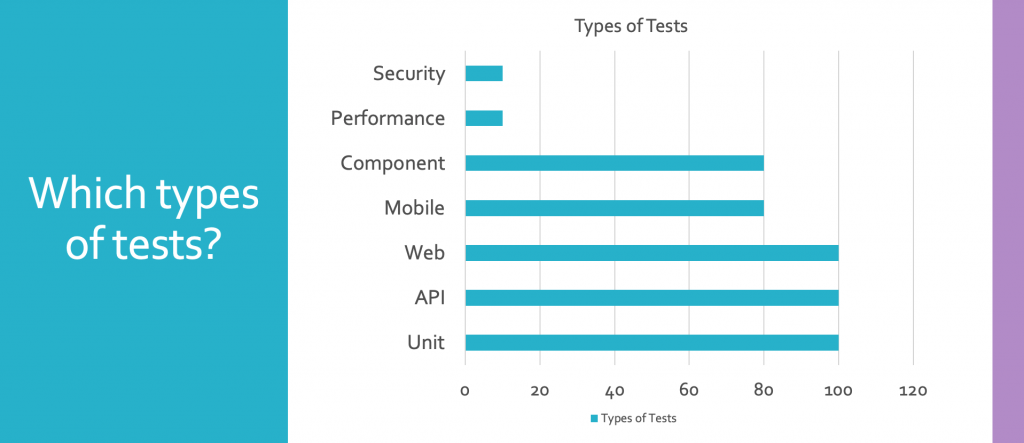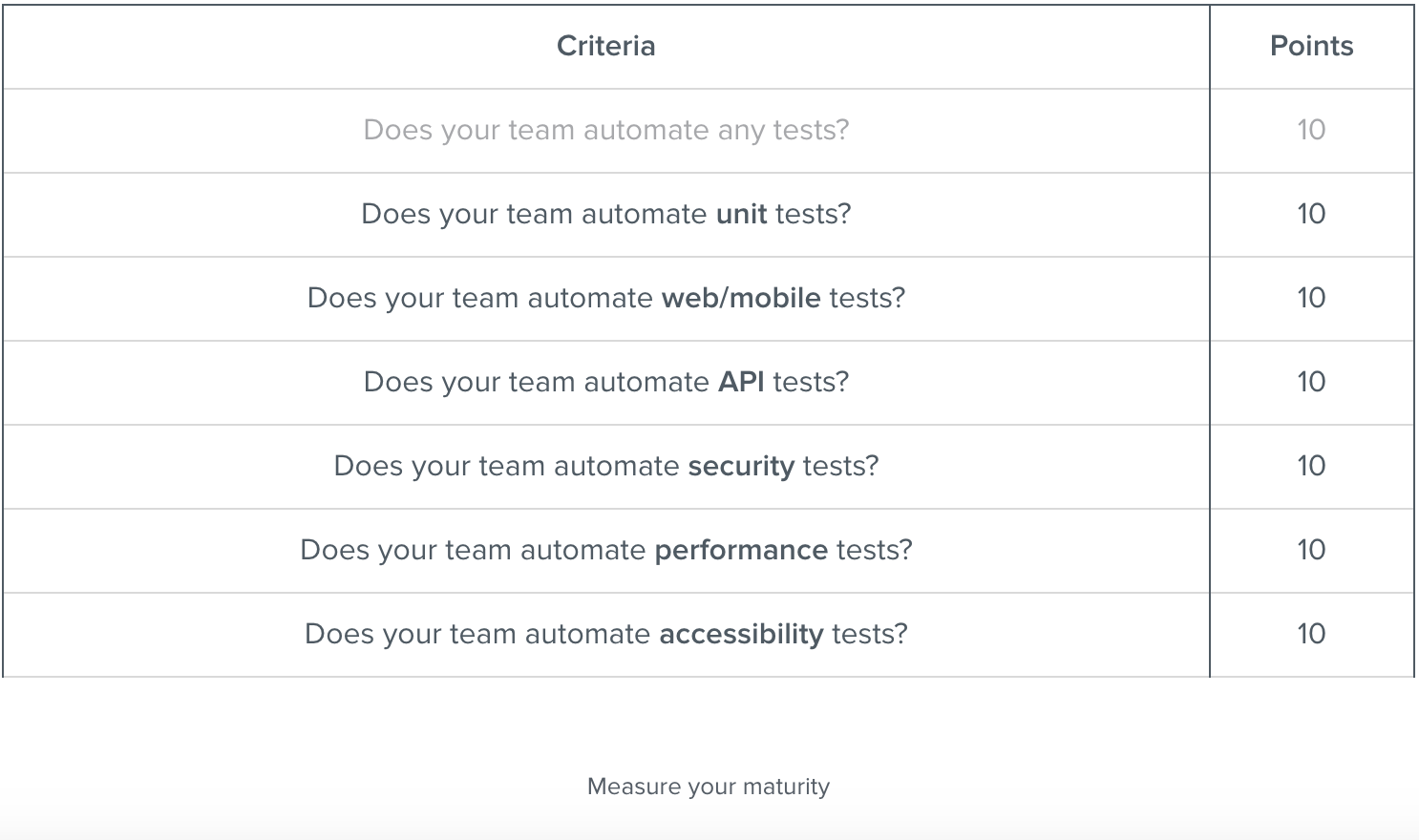I’m a Developer Advocate and one of the things I love most about my role is that I travel all of over the world — meeting and consulting with engineering teams, and discussing the challenges that they face.
One thing that I’ve realized about building quality software is…the struggle is real!
Everyone is trying to figure out how to rapidly-produce software that is yet of high quality. So we did some research (shout out to Moshe Milman who helped with this effort) and gathered best practices from some of the top companies in software, financial services, healthcare, gaming, and entertainment verticals and I’ll share with you what these innovative development teams are doing to achieve great levels of success with their test automation initiatives.
As I go through the points of research, feel free to grade your team’s maturity in that respective area. By the end of the article, you’ll have your Test Automation Maturity Level.
Automated Tests

100% of companies researched automate their tests
For starters, 100% of the companies we researched employ automated tests to expedite their release cycles. When the goal is to release software on a continuous cycle, test automation is a must-have. There simply isn’t enough time to manually test every new feature as well as manually execute regression tests to make sure existing functionality isn’t broken. So these teams invest an extensive amount of effort into automating their tests so that they are confident in their product each time they deploy.

Percentages showing who on the team is responsible for writing tests
I know from personal experience how difficult it is for developers to find the time to write tests and also how difficult it is to have test teams write the code to automate tests, so we inquired about this a bit more to determine how are teams overcoming these challenges.
Every single one of these companies has its developers involved in writing tests. Many of them said their developers take care of the unit tests, while the QA team is responsible for writing the integration and end-to-end tests.
A whopping 60% of the teams shared that they no longer have the distinction between development and QA engineers, and instead have hybrid engineers. Their goal here is to have developers own ALL the testing of their code, as well as the triaging and maintenance of those tests.
What they discovered is what I already know — developers aren’t the best at this. There’s not much time, and frankly not much interest from developers to go beyond writing their unit tests. So, many of these teams have had to bring in qualified experts to help out.
I dug a bit more to learn how exactly the Quality Advocates are assisting here. We got a variety of answers but here were some of the common ones:
- Write test infrastructure
- Coach developers on how to write better tests
- Develop a testing strategy
Let’s discuss each of these…
Write Test Infrastructure
The Quality Advocates find the best testing libraries, create the test automation codebase, and all of the utility functionality the developers will need to write their tests. That way it’s not much overhead for the developers. The developers can just focus on cranking their tests out.
Coach Developers
Unfortunately, many of the Computer Science and Bootcamp programs that graduated your developers did not teach them how to test. This is a huge hurdle for developers who may have good intentions and want to test their code. They may not ever share this with you, but a LOT of the developers that I speak with simply don’t know how to test. These quality advocates specialize in this stuff and can help the developers think of scenarios, as well as teach them how to write good tests. If you think this may be a problem for your developers and you don’t have a quality advocate just yet, send them to Test Automation University which is an online learning platform that provides free courses on this very thing.
Develop Testing Strategies
Finally, quality advocates develop testing strategies for the team. They help them assess risk and come up with a plan of attack on what should be tested and how thoroughly.
They also have a big picture view which is greatly needed because your developers are zoned in on their features and their tests. Someone needs to consider how these features interact with one another so that more sophisticated tests can be developed.
Someone also needs to strategize on which tests automatically run given certain pull requests. The advocate can help with that.
The quality advocates also help keep the test suites relevant by pruning out tests that are no longer of high business value.
Criteria: Does Your Team Automate Any Test?
If your team automates _any _tests at all, go ahead and give yourself 10 points!

Types of Automated Tests
We wanted to make sure that we were talking about more than unit tests here, so we inquired about which tests the companies automated.

- Every one of these companies automated their unit, web, and API tests.
- 80% of the companies who develop mobile apps automated their mobile tests.
- 80% of companies create reusable web design components and automated tests for those.
- However, there was very little effort by the core development teams to automate non-functional tests. Areas like security, performance, and accessibility testing were mostly handled by separate groups, like the Center of Excellences.
Criteria: Which Type of Tests Do You Automate?
Give yourself 10 points for each of the types you automate: unit, web/mobile, API, security, performance, and accessibility. If your team does not develop mobile apps, just give yourself 10 points so that you don’t have a deficit. The same goes for if your company does not develop web apps or APIs.

Programming Languages
I did some research last year on the top programming languages used in test automation. This included all sorts of companies, not just the mature top dogs. The vast majority of teams are using Java (44%) and while JavaScript was on the rise and came in at #2, it was still only 15%.
This was interesting compared to what the top dogs are using. ALL of them use JavaScript! Some have teams that use other languages in addition to JavaScript for things like native mobile testing and APIs, but for their web apps, it’s JavaScript.

Programming languages used for test automation
I inquired why this is and they explained that their web developers are JavaScript programmers. Some companies even said they had legacy test frameworks built in other languages and their devs wouldn’t touch it! When they switched to JavaScript, the developers became more engaged.
I found this interesting because it aligns with what some thought leaders have been preaching for years. I’ll admit, I’ve been a bit stubborn over my career and I tend to go for the language that the automation will be most comfortable in but it seems perhaps I need to rethink that when I want the developers to contribute.
And to be fair, JavaScript automation tools have gotten much better in recent years…which brings me to the next point of research…
#tutorial #performance #testing #programming #automation #test automation #automated testing #qa #automated testing best practices
